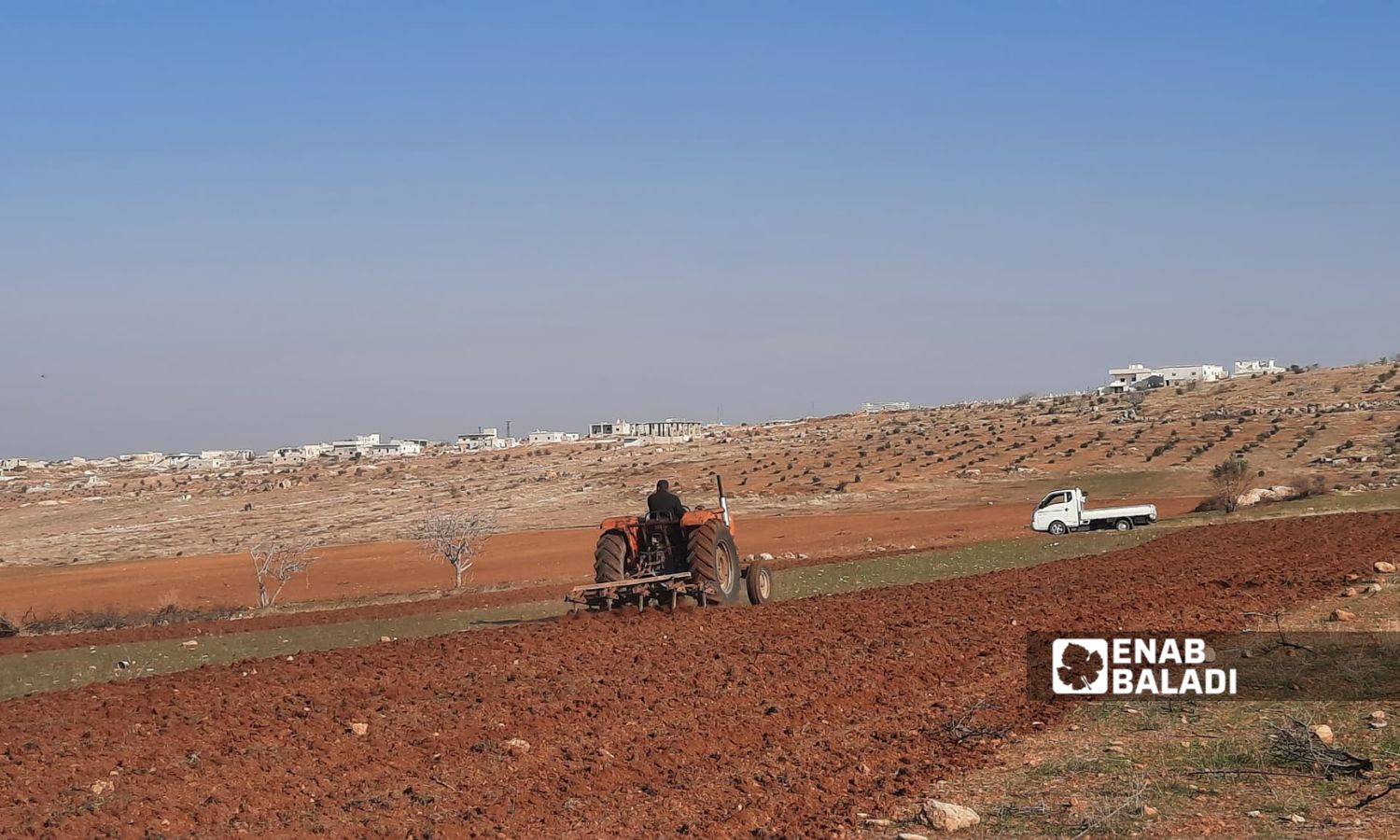



Idlib – Samah Alloush
Wide areas of land in southern Idlib have turned barren and empty due to the practices of the previous Syrian regime and its affiliated militias, which over the past years have stolen its resources, uprooted its trees, and stolen its equipment.
Farmers returned to their lands with a mix of joy and sorrow, including Abdul Sami’ (65 years old), who expressed his sadness after seeing his land, which is empty of life and trees, where he grew up, saying that “the land is honor,” referring to its high status in his heart.
Despite the pain felt by farmer Abdul Sami’, his determination was not dampened; he returned to his land in Kafr Nabl in southern Idlib and began plowing and planting cumin and black seeds.
He told Enab Baladi that during the “marbaniya” (the winter quarter) which is the period of coldest weather, extending from December 22 until the end of January, it is possible to plant seeds of cumin, black seed, anise, coriander, safflower, sesame, and others.
Regarding seed prices, Abdul Sami’ mentioned that the price of a ton of cumin reached 3,200 USD, while black seed was 1,700 USD, green anise was 1,900 USD, coriander was 800 USD, and the safflower which is considered the most expensive among seeds reached approximately 8,700 USD per ton.
Farmer Mohammed (35 years old) returned to his village, Deir al-Gharbi, in southern Idlib’s Maaret al-Numan region and planted his land with wheat and barley before the planting deadline, as his planting would not succeed with the onset of the winter quarter.
The price of a ton of durum wheat seed reached 350 USD, while the price per ton of barley seed was 300 USD, and zero lentils reached 500 USD.
Cultivating one hectare with cumin crop requires 40 to 50 kilograms of seeds, while for wheat, it requires 250 to 300 kilograms.
The high agricultural costs, including plowing, seeds, fertilizers, pesticides, and irrigation, have led many farmers to refrain from returning and cultivating their lands, as confirmed by farmer Rashid (55 years old) from the city of Saraqib.
Rashid decided to rent out his land because he cannot afford the costs of cultivating it from scratch while he could rehabilitate his house, which the regime destroyed parts of, and save himself the cost of rent for another house.
The eastern and southern rural areas of Idlib and northern rural Hama are among the most affected areas in Syria, where most trees have been completely cut down, according to a statement from the Assistant Minister of Agriculture and Agricultural Reform, engineer Tammam al-Hamoud, to Enab Baladi.
According to al-Hamoud, no survey has yet been conducted on the areas of cut trees from the lands.
Regarding future plans to improve the agricultural sector in Syria, al-Hamoud mentioned that the ministry will work on the issue of material loans to support farmers. In addition, there will be a focus on marketing agricultural products and packaging them according to the needs of the countries importing agricultural products from Syria.
The ministry will also work on improving livestock and producing improved young livestock, vaccinated chicks, and laying hens.
Al-Hamoud provided some advice to returning farmers, such as using modern agricultural technologies that save effort and time, especially in irrigation, improving agricultural production, and relying on agricultural plans that the government will implement in the future, which will be based on local market needs to ensure that there isn’t surplus production leading to price drops and losses.
The conditions of displaced farmers are similar in most areas of Syria, including those in Hama’s countryside, who have not yet completed their joy after the fall of the Syrian regime by returning to the lands from which they were displaced, due to problems that hinder them from resuming agriculture.
According to a previous report prepared by Enab Baladi, the soil of the lands is tired and depleted, having been subjected to severe injustice, such as stolen equipment, uprooted trees that were decades old, rats’ infestations, emergence of harmful plants and weeds, in addition to the biggest danger being leftover chemical and explosive materials.
There are obstacles to farming, such as high production costs, as most returnees from the displaced have seen a deterioration in their financial conditions after leaving their source of income, displacing to other areas, and bearing additional costs such as rent and living essentials. Additionally, merchants are relying on imported crops from Turkey at a lower cost, resulting in significant losses for local crop prices.
Other problems include fields of mines planted by the previous regime’s forces in various areas of rural Idlib, Aleppo, and Hama, which poses a danger to farmers’ lives and prevents them from returning to work.
According to statistics obtained by Enab Baladi from the Syria Civil Defence, 40 people, including 8 children and a woman, were killed due to mine explosions and war remnants during the period from October 27, 2024, to January 19 last (since the start of the “Deterrence of Aggression” operation.
In a previous statement to Enab Baladi, the Civil Defence has identified 134 minefields and points of landmines (including anti-tank and anti-personnel mines) in Idlib, Aleppo, Hama, Deir Ezzor, and Latakia. The Civil Defence also provided 330 practical training sessions for residents before they return to the areas from which they were displaced.
if you think the article contain wrong information or you have additional details Send Correction